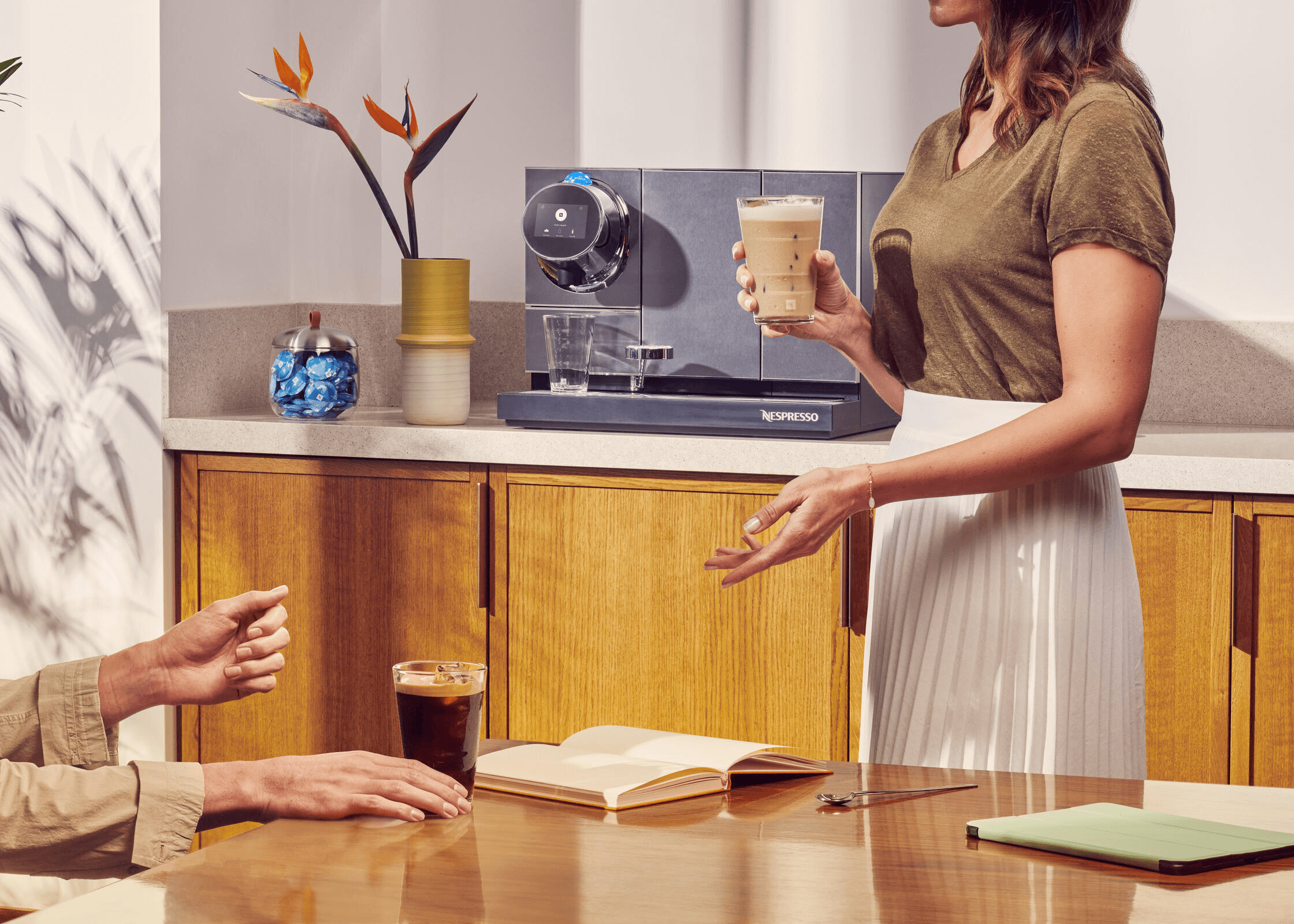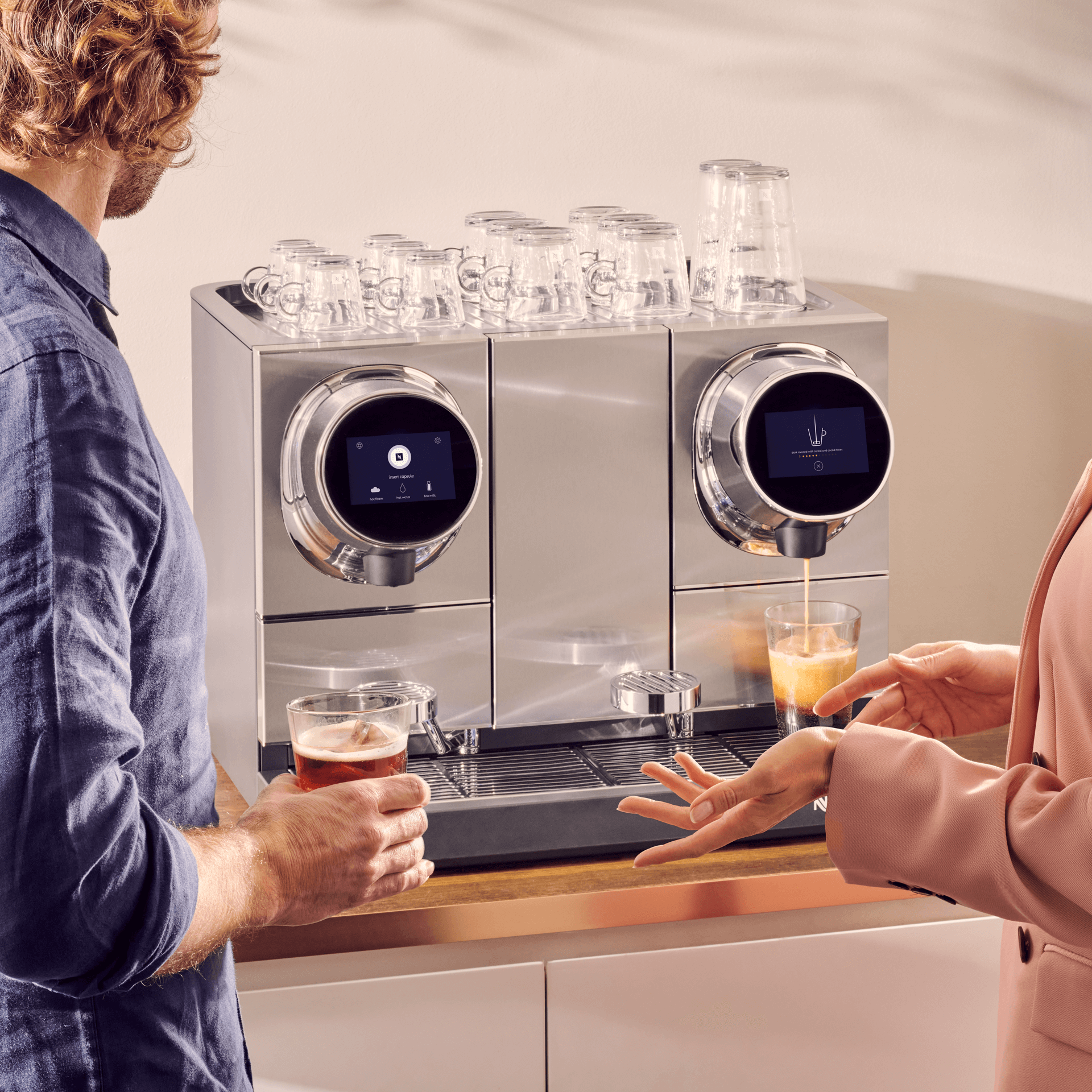25 October 2025
The science behind coffee consumption in the office
From a comforting morning ritual to a mid-afternoon pick-me-up, coffee plays a central role in modern workplace culture.
But beyond the tantalising aroma and that much-needed energy boost, can a fresh cup of coffee actually make us more productive at work? As it turns out, the answer is yes, and science backs it up.
Let’s take a closer look at how coffee enhances workplace performance – both directly through its effects on the brain and indirectly through its impact on morale, social connections, and job satisfaction.
Is there a correlation between coffee and productivity?
The answer is positive and is supported by abundant scientific evidence.
For instance, a 2012 study showed that consuming caffeine leads to increased alertness and significantly improves performance on simple and complex attention tasks.1
In a more recent study, researchers found that after a week without coffee breaks in the workplace, 77% of participants experienced a sharp decrease in productivity, and 70% felt they would be more inclined to leave their jobs.2
However, excessive caffeine consumption can also have negative effects such as anxiety, jittering, an elevated heart rate, and disrupted sleep patterns. On average, a healthy dose shouldn’t exceed three cups of coffee per workday, although the ideal amount depends on the sensitivity of each individual and drink strength.3
Moderation, as always, is crucial. Pay attention to how you feel after each cup to determine your limit.
How coffee affects the brain and boosts productivity
Beyond higher employee satisfaction, drinking coffee can improve brain reaction time and productivity in a variety of ways. Here are four areas in which caffeine provides workers with a welcome performance boost.
1. Alertness
One of caffeine’s most sought-after effects is blocking adenosine receptors, a neurotransmitter that promotes relaxation and sleepiness.
As a result, you feel more awake, alert, and ready to tackle the next item on your to-do list.4
In particular, drinking coffee in the morning after a good night’s sleep is the most effective way to leverage its alertness-boosting effects. Your body is well-rested, and the caffeine gives you that extra boost needed for waking up.
2. Focus
In the bustling environment of an office, maintaining concentration for a full day can be challenging. However, studies show that drinking coffee can increase focus and attention as well, making it easier to stay on task even during long meetings or complex projects.5
3. Cognition
Studies have found that caffeine increases brain entropy, a measure associated with higher levels of information processing. In other words, a cup of coffee can help your brain think more clearly and flexibly.6
However, timing matters. Drinking coffee too late in the day can disturb your sleep, which, in turn, reduces cognitive function the next day. Morning to early afternoon is the ideal window for a coffee-fuelled productivity boost without sacrificing rest.
4. Memory and learning
One lesser-known beneficial effect of caffeine is its role in enhancing the brain’s ability to retain new information.
A recent Johns Hopkins study suggests that moderate coffee intake enhances memory function, making it easier to recall important data or instructions when needed.7
This means that, whether you’re upskilling for a new project or onboarding a new system, coffee can help your brain stay sharp and learn faster.

The indirect ways coffee increases productivity
Mood and motivation
Beyond the purely cognitive health benefits, coffee also has a positive impact on mood.
Caffeine stimulates dopamine production – the “feel-good” neurotransmitter linked to motivation, enjoyment, and drive, which is part of why coffee can make even routine tasks feel more rewarding, even on a hectic Monday morning.
Job satisfaction and the social benefits of coffee breaks
The benefits of coffee go beyond biology. In a Nespresso Professional study, 81% of respondents across the UK and Ireland confirmed that coffee breaks are essential to nurture interpersonal bonds, fostering a culture of collaboration and care in the workplace.8
Even short breaks play a vital role in driving long-term employee satisfaction and productivity. They create the context for casual conversations that spark creativity, resolve minor issues informally, or simply give employees the emotional reset they need to finish the day strong. It’s a small habit with a surprisingly big payoff.

What’s the best coffee for the workplace?
While the social and productivity benefits of coffee are undeniable, the style of drinks offered, the quality of the blends, as well as the capacity and ease of use of the machines used for that service, can make a big difference in how coffee is experienced.
As a rule of thumb, you should look for solutions that offer:
- Speed and simplicity: In a fast-paced work environment, people want great coffee that can be brewed quickly and conveniently. Avoid overly complicated barista machines that create queues and confusion.
- Consistency: Opt for coffee makers that can deliver the same high standards of taste every time. No bad surprises or unpleasant sips of burnt brew. Just the rich flavour of pure coffee aromatics.
- Variety: Not everyone enjoys coffee the same way. Nespresso Professional offers over 20 premium blends and a variety of brewing styles, from bold ristrettos (25ml) to smooth lungos (110ml), so everyone can find their perfect match
- Sustainability and convenience: Each Nespresso capsule is hermetically sealed in aluminium to protect the coffee from air, light, and moisture, preserving its full flavour and over 900 aromas for up to 12 months. And what’s best, aluminium is also 100% recyclable.

Why Nespresso?
At Nespresso Professional, we understand that great coffee is more than a beverage – it’s a workplace essential that brings people and ideas together.
Our mission is to elevate this experience, delivering barista-quality coffee drinks consistently and conveniently with just the push of a button. That’s why we work hard to offer:
- High-quality coffee with a rich, consistent taste
- Fast and simple coffee brewing
- Sleek, space-saving machine designs suitable for any team size
- A wide variety of sustainably sourced coffee blends
- Reliable, easy-to-maintain technology
Explore our range of coffee machines to find your perfect match today, and book your personalised coffee experience to get a taste of what Nespresso can do for your workplace.
References
1. Einöther SJ, Giesbrecht T. Caffeine as an attention enhancer: reviewing existing assumptions. Psychopharmacology (Berl). 2012 Jan;225(2):251-74. doi:10.1007/s00213-012-2917-4. Epub 2012 Dec 16. PMID: 23241646.
2. Source: a 2024 Connect Vending study of 30 participants tracked over five working days in the office
3. Aggeler M. How much coffee is OK for me to drink in a day? I asked the experts. The Guardian [Internet]. 2024 Apr 8 [cited 2025 Aug 21]; Available from: https://www.theguardian.com/wellness/2024/apr/08/coffee-benefits-hazards-experts
4. McLellan TM, Caldwell JA, Lieberman HR. A review of caffeine’s effects on cognitive, physical and occupational performance. Neurosci Biobehav Rev. 2016 Oct;71:294-312. doi:10.1016/j.neubiorev.2016.09.001. Epub 2016 Sep 16. PMID: 27612937.
5. Raise-Abdullahi P, Raeis-Abdollahi E, Meamar M, Rashidy-Pour A. Effects of coffee on cognitive function. Prog Brain Res. 2024;288:133-166. doi: 10.1016/bs.pbr.2024.06.016. Epub 2024 Jul 15. PMID: 39168555.
6. Chang D, Song D, Zhang J, Shang Y, Ge Q, Wang Z. Caffeine Caused a Widespread Increase of Resting Brain Entropy. Sci Rep. 2018 Feb 9;8(1):2700. doi: 10.1038/s41598-018-21008-6. PMID: 29426918; PMCID: PMC5807546.
7. Borota D, Murray E, Keceli G, Chang A, Watabe JM, Ly M, Toscano JP, Yassa MA. Post-study caffeine administration enhances memory consolidation in humans. Nat Neurosci. 2014 Feb;17(2):201-3. doi:10.1038/nn.3623. PMID: 24287751.
8. Source: Nespresso/ComRes survey of 2,500 employees across the UK, 2017.
Related Articles
Let us bring the Nespresso Professional Coffee Experience to you
Recharge without charge. Book a free Nespresso Professional ‘coffee morning’ (or afternoon) to discover the benefits that premium coffee can bring to your business.
Book Now




